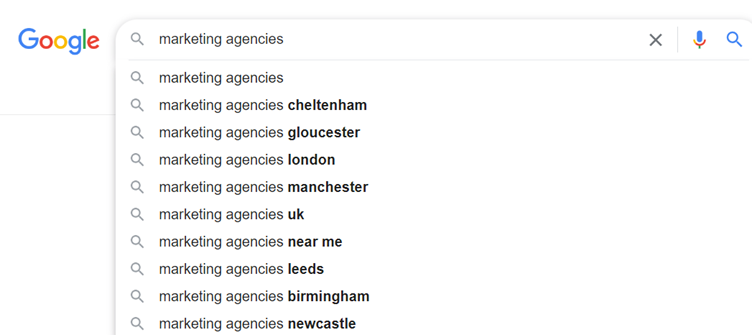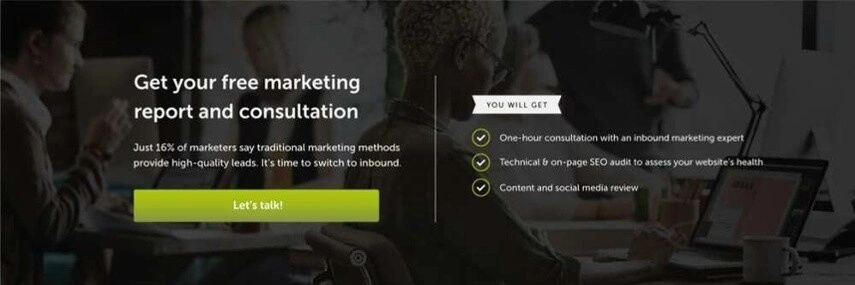What are keywords & how do they impact your inbound marketing?

Launching a successful inbound marketing strategy involves a lot of planning.
From content to social media, email to website development and beyond, there’re many different factors you need to take into consideration – however before you do any of that, you need to decide on the main keywords for content!
But what exactly are inbound marketing keywords exactly, and why do they matter so much to your strategy? Read on to find out...
Keywords are, in short, the terms people use to get information online
When a person visits a search engine like Google and types in a query into the search bar, they are using a keyword to find the information they are looking for.
For example, if you were looking for a marketing agency, you might start your search by typing in “marketing agencies” into Google search – this is your keyword!

Why are keywords important?
As a marketer, you want your content to show up in the search engine results pages (SERPs) for searches related to your business and solutions.
Using specific keywords in your content helps to tell the search engines what your content is about.
So, when someone searches for a keyword, if you use that same keyword in your content, there is more chance of your web page showing up!
And while there is much more to SEO than keywords, these are always the starting point.
If you create a high-quality piece of content around a keyword phrase, and that content gets social shares and backlinks from authority sources, there's a good chance it will show up for specific keyword searches.
Keywords can also guide the creation of new content, because you can write or devise the type of content that will interest the people who are searching for that keyword, and then draw the searchers into your funnel.
In short, using keywords helps you to get found more easily by people searching for topics related to the solutions you provide. This generates more targeted traffic, and that means you have more chance of converting that traffic into leads.
There are two main types of inbound marketing keywords you need to know about:
Short tail keywords
A short tail keyword is defined as being shorter, less specific and (often) more competitive. The search volume for these tends to be higher, but the traffic is less targeted.
In the example above, ‘marketing agencies’ is a short tail keyword. It could apply to any marketing agency of any kind, and it is therefore likely to be very competitive. But we can use it as a starting point to find more relevant keywords.
Long tail keywords
A long tail keyword comprises more words, usually four or more. It is also less competitive and easier to rank for. Because it is more specific, the searcher is more targeted. However, due to being more specific, the search volume is usually lower.
For example, people might search for something more specific like 'marketing agencies in Cheltenham' or 'inbound marketing agencies in Cheltenham'.

Different keywords also come with different intent
Keyword intent basically means what’s someone’s purpose is behind the search. There are four main types of keyword intent:
Informational
This is where the person wants to find an answer to a specific question – for example, “what are inbound marketing keywords?”
Commercial
The person is looking to investigate brands or services in this case – for example, “inbound marketing agency Cheltenham”
Transactional
Here, the person is planning to complete a specific action, or "conversion” – for example, “marketing agency hire”
Navigational
In this case, the person is looking for a specific page or site – for example, “Angelfish Marketing”
It’s important that you match the intent of the keyword to the content you’re optimising it with; for example, if you’re writing a blog that aims to answer a question a prospective customer might have, ensure that you use an informational keyword.
Or, if you’re optimising a product page on your website, you should use a transactional keyword.
So, now you know what inbound marketing keywords are and why they’re important... how do you go about using them effectively?
1. Start by doing keyword research
Our dedicated blog on how to approach keyword research for inbound marketing explains everything you need to know!
2. Establish your topic clusters
Once you’re happy with the keywords you’ve found from your research, it's time to arrange these into relevant topic clusters.
In short, a topic cluster is where you have a pillar page which covers an overarching topic, which will then link out to blogs (that in turn link back to the pillar page) that go into more detail on certain areas of that topic.
For example, here at Angelfish, one of our topics/pillar pages is “Content Marketing,” which links out to relevant blogs (that also link to each other), such as “Do I really need a B2B content marketing strategy?” and “12 simple tips to make your blog stand out from the crowd” - each of which are optimised for their own keywords!
Take a look at your keywords and see which topics they naturally fall under!

3. Do an SEO audit of your current web pages
We’ve explained more about SEO audits in this blog, but in the context of keywords, this will enable you to see which keywords you’re already ranking for (if any), and where there are gaps that you need to fill.
4. Create blog titles and additional pillar pages based on your keywords
Once you’ve got keywords assigned to your website’s current content, you can start planning out new content that your other keywords can be assigned to!
For example, we might use the keyword “how to write a B2B blog” in our creation of a blog titled “How to write a B2B blog that’ll bring high quality leads to your business.”
5. Implement the keywords within your content
In brief, for the highest impact, you should include your keyword in your content’s:
- page URL
- meta description
- meta page title
- H1 (blog title) where possible
- no more than three times throughout the content
- in the alt text of any images you use to illustrate the content
We’ve broken this down into more detail in our complete guide to content optimisation for inbound marketing.
Important note: While choosing relevant keywords in your content is essential, you should never simply cram in as many as you can – this is called keyword stuffing, and it doesn’t work! Be sure to use them naturally and only where it makes sense to do so.
As you can see, keywords are crucial for successful inbound marketing...
…but they can understandably seem quite intimidating when you’re just starting out. What’s more, they’re just one of the many factors you’ll need to consider for your overall inbound marketing strategy!
As inbound marketing specialists here at Angelfish, we’re on hand to help! Book your free marketing consultation and report with us today to get a lowdown on your current keyword/SEO/content performance and more...

Ready to Unlock AI SEO for Your Business?
AI SEO isn’t coming — it’s already here. Capture high-intent traffic and build sustainable pipeline growth.
Get Your Free Audit

